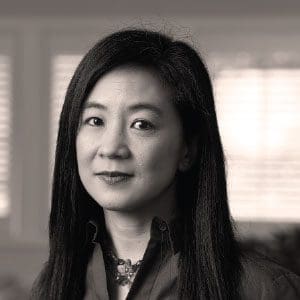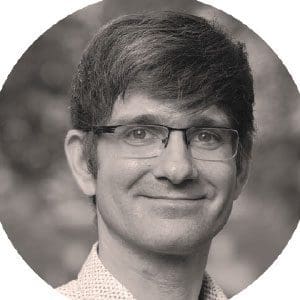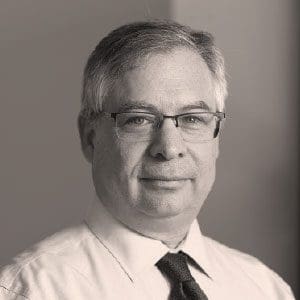
It’s almost impossible to avoid these days: the arguing, the posturing, the bullying—it’s hard to shut out. Whether airing on cable news channels or infiltrating our social media feeds, the sense of extreme polarization of the political arena in the United States is front and center. The arguments never seem to get resolved, everyone walks away in a huff, and meanwhile, democracy as the bedrock of the nation is teetering.
How do we come together and work on our seemingly insurmountable disagreements? Can universities like Johns Hopkins lead the way? How do we encourage young people to examine and pursue the notion of authentic civic engagement?
Enter the Stavros Niarchos Foundation (SNF) Agora Institute at Johns Hopkins University.
A 21st-century SNF Agora
“We are in a moment of deep uncertainty around the world with respect to democracy,” says Hahrie Han, inaugural director of the SNF Agora Institute, which is part of the Krieger School of Arts and Sciences. “We desperately need fresh thinking. The university has a unique role to play in generating those new ideas.”
Founded in 2017 with a $150 million grant from the Stavros Niarchos Foundation, the institute aims to promote informed, inclusive civic dialogue and pull down some of the dividing walls between us. Its hires have included not only top academics in various fields—political science, sociology, history, and international affairs—but also journalists and public intellectuals, such as Anne Applebaum and Yascha Mounk. A visiting fellowship program attracts a diverse group, from poets to social activists, who are involved in teaching and other aspects of the institute’s work.
The SNF Agora Institute will soon take up residence in a new building on the southwest corner of the Homewood campus. While the institute primarily engages Hopkins faculty and students—including with a brand-new minor in civic life—the building was designed to attract people beyond academia to converse and debate about critical issues.

“We are in a moment of deep uncertainty around the world with respect to democracy. We desperately need fresh thinking. The university has a unique role to play in generating those new ideas.”
—Hahrie Han,
Inaugural director of
the SNF Agora Institute
Why Johns Hopkins? Why now?
Debates about democracy go back to the days when the citizens of Athens gathered in the original agora—the place that gave the institute its name—to hash out their differences in that city’s nascent democracy.

“The opportunity to use the resources of a university to support democracy, to better understand its weaknesses and strengths, and then to use that in education is really exciting,” says Andrew Perrin, who—like all SNF Agora faculty—has an appointment in an academic department, in his case sociology, where he is the chair. “It’s the reason I came to Hopkins.”
Perrin’s research goes to the heart of political discourse these days. “I’m interested in the pitfalls and problems around arguing well in public, the ways people mess up trying to use evidence. There are really things we in higher education can do to model good behavior, good debate. We can champion free speech so a lot of different voices are heard, but make sure that all of those voices are subjected to careful scrutiny.”
Han and Perrin agree that another reason universities are ideal for exploring new ideas is because they give scholars an opportunity to pursue open-ended questions.
“We are different from other organizations because being at a university affords us the freedom to follow lines of inquiry where the payoff is not clear from the outset,” says Han. “That allows us to research questions that might seem risky, but do that research with independence.”
And the SNF Agora faculty is out there on the cutting edge, using the tools of a variety of academic disciplines to explore what’s going on as democracy faces a variety of threats.
A new minor in civic life
Though the SNF Agora Institute has been offering undergraduate courses for some time, now it’s taking the next step: engaging students in a minor in civic life, designed to impart lessons they will carry with them whatever path they take.
“The aim is to equip students with the skills and motivation they need to engage productively in civic life, no matter where they live, or what they do,” Han says.
The institute is offering a minor in civic life instead of a major by design: Leaders believe that by opening the minor to students of all kinds, from pre-meds to English majors, the institute will bring in students from across the university who are curious about the subject but have never been immersed in it.
“We’re trying to reach all students, not just the usual suspects,” Han says. “We’re hoping that if they came to Hopkins to study, say, a STEM subject, they’ll see the minor as a way of helping them round out their education. Whether they become doctors or physicists, they will still need to engage with their communities, to participate in public life in some form.”
Engagement at all levels
Han and others at SNF Agora hope that such engagement, at whatever level it takes place, plants the seeds that will grow into a future for democracy that moves beyond the divisiveness that characterizes so much of the public forum today, not only in the United States but in many countries around the world.
As Consuelo Amat, a political scientist at SNF Agora, puts it: “We want to get as many undergraduates as possible to understand what it means to be a citizen in a democracy.”
Amat studies how democracy can emerge from dictatorships, how civil society can be built in peaceful, non-violent ways after violent revolutions. This is not an abstract topic to her; she has been on the ground working with peace builders in Latin America and Africa even as she uses her academic tools to evaluate effectiveness of that work. That’s the kind of experience she’s bringing to the classroom, where she’s teaching Introduction to Civic Life.

“A foundational curiosity”
“I think the minor in civic life is an excellent idea,” says recent graduate Andres Mejia, now a student at Hopkins School of Advanced International Studies. While an undergraduate, he took three courses connected to the institute. “They all forced me to think about democratic political institutions, how they function, and— more recently—how they are undone.”
Mejia says he found the course Introduction to Civic Life, which will be required of all those taking the minor, particularly powerful. “It not only inspired this sense of duty, but also gave me the tools to fulfill it, offering practical classes like how to negotiate, tell a public narrative, or debate critical issues.”
In addition to Introduction to Civic Life, the minor consists of two seminars on civic life—one a capstone project—and three approved electives from various departments. It’s a course of study that has the potential to hit that ideal of a Hopkins undergraduate education: first-rate teaching enhanced by top-quality research.
SNF Agora becomes a force
Another recent graduate, Ryann Schutt, says her encounters with the SNF Agora Institute were life-changing. “I was able to watch Hahrie build an organization that really became a force on campus, offering a new and different approach to thinking about democracy.”
Schutt says she was particularly attracted to the research being conducted through the institute.
“When I saw the research that people on the faculty were doing, understanding what data means in social sciences, I realized how it’s possible to make the ordinary person powerful in a democracy,” she says. “There was a real arc to my learning; it set up a foundational curiosity that I have taken with me from my time there.”
That foundational curiosity can support students as they transition from campus life to the professional world. Bryce Corrigan, director of undergraduate studies for the minor, says that the multidisciplinary nature of SNF Agora’s work can prepare students no matter what kind of career they choose after Hopkins.
“What we study is the civic sphere, and that’s not always the political sphere,” says Corrigan. “It can mean working in local communities, it can mean PTA meetings, religious organizations, nonprofits, even someone’s workplace in the private sector. We want to affect how our students will function in meetings and groups and organizations in their jobs. We want them to be equipped so that when they’re in very divisive discussions in any aspect of their lives, they know how to interpret data, know when to be skeptical, know what to believe given the evidence presented.”

“We want [students] to be equipped so that when they’re in very divisive discussions in any aspect of their lives, they know how to interpret data, know when to be skeptical, know what to believe given the evidence presented.”
—Bryce Corrigan,
Senior statistician and lecturer

The challenges
Some of the institute’s research has examined long-standing debates in academia about what the nature of polarization in America is. When we look at policy preferences, people from both sides of the political aisle show surprising levels of agreement. Yet, socially, we are living in spheres that rarely connect.
“People on each side vastly overestimate negative attitudes and behavior of people on the other side,” Han says of the divisions we face in this country. “Democrats overestimate Republican support for violence, while Republicans tend to see all Democrats as ‘woke warriors.’ Our colleague Lily Mason has shown through her research that this happens in part because partisan identities have become layered on top of social identities. People have become effectively polarized even as they might agree on policy positions. Technology exacerbates this problem. Various platforms elevate extreme voices on both sides, obscuring people in the middle who might still want to work with each other.”
Teaching for a new age at SNF Agora
Everyone on the faculty at SNF Agora recognizes that the students they teach are living in an information and political sphere that is radically different from the one that existed when they came of age socially and politically. This makes their mission all the more crucial as they are trying to train students to be intelligent analysts and consumers of information and arguments, no matter what form the rapidly changing media and political environment morphs into.
Perrin says his research shows that focusing on the misinformation that we see people getting from various online and other sources is “putting the cart before the horse.”
“It’s not that people develop their opinions based on bad facts, it’s that people use their opinions to decide what the facts must be,” he says. “So instead of critically thinking about issues, it becomes mostly about connecting with your community, with people who share your opinions and therefore are those you see as the most trustworthy when it comes to facts.
“The danger with students is that they become cynical about all this,” Perrin says. “What we need to do is find the sweet spot, keeping them from becoming too cynical while still understanding the dangers of all the misinformation out there in that cacophony.”

“It’s not that people develop their opinions based on bad facts, it’s that people use their opinions to decide what the facts must be.”
—Andrew Perrin,
Professor of sociology
A more uncertain world
Han points out it’s not just information that’s problematic.
“There’s a lot of data that shows this generation knows they are facing a much more uncertain world,” she says. “With climate change, the changing structure of the global economy, and all the other socio-political changes happening, the world is a very uncertain place right now and young people are aware of that. Our aim at SNF Agora is to equip students with the skills and motivation they need to engage productively in civic life. We want them to become engaged in ways that are fulfilling and productive, even in the midst of uncertainties.” ■
Five tips for effective dialogue

This article is about preparing students to be active, effective participants in the messy dialogues that comprise democracy. But how does that actually look? What does it take to have the kind of conversations that help us—as a family, organization, university, nation, or as global citizens—move closer to where we want to be? Sociologist Andrew Perrin offers some concrete suggestions:
1. Don’t be scared of argument.
Be honest on issues you care about, and give evidence for why you care. “I do think that civil conversation is good stuff. But I think that frank conversation is more important.”
2. Listen well.
Listening doesn’t mean agreeing; it means really understanding what your opponent believes and why. When you tell your opponent what you hear them saying and that you respect it, but also why you disagree, that can lead your opponent to respond with similar generosity. “You should be arguing against your opponent based on what they’re actually saying, not based on what you imagine them to be thinking.”
3. Expect emotion.
This is natural when discussing issues that matter. “One of my favorite political theorists, Danielle Allen, wrote that if we make calm, rational engagement the ticket for entrance into the conversation, we’ve just left most people out of the conversation.”
4. Ask for and provide evidence.
But bear in mind that evidence doesn’t just mean external facts. It’s rare that a fact will emerge that determines one side is right and the other wrong. Facts only become evidence through the process of argument. Ask, why do you think that? Can you give me some explanation as to how that works? What makes you believe this is true? “Tell me why you think what you think, and why I should think what you think. And listen for why your opponent thinks you should agree with them.”
5. Know that changing your opponent’s mind is probably not a realistic goal.
But there’s usually an “audience”—whether at a PTA meeting, academic panel, dinner table, or online—and the audience can consider evidence and learn from your modeling of frank and respectful conversation.



